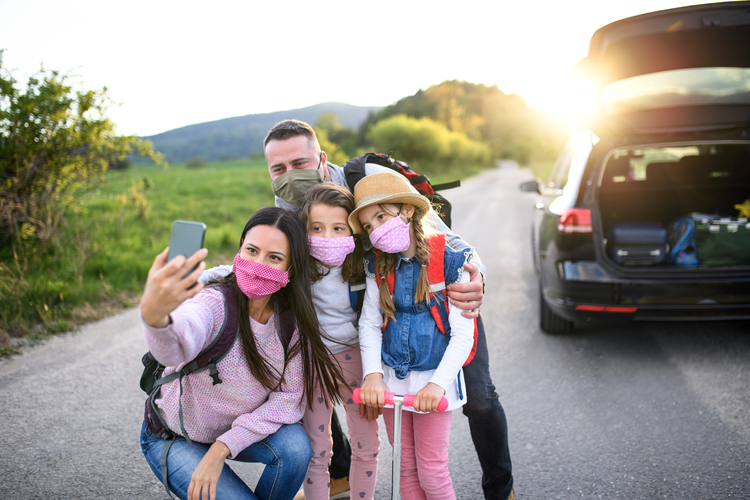
With COVID-19 still spreading rapidly in certain areas of the country, everything about “normal” life has been upended, travel included. In fact, the Centers for Disease Control and Prevention (CDC) is still recommending that people not engage in leisure travel and stay home to stop the spread.
For those who do want to venture out, experts say the safest thing to do is take a road trip. That doesn’t mean it’s risk free. No matter the time of year, you’ll still encounter numerous germy hot spots during your trip, including public bathrooms, restaurants, gas stations, and lodging. With some simple strategies though, you can minimize your risk.
Pre–road trip strategies
Research your destination and the route you'll be taking: Where you're going and what you'll be doing once you get there has become a huge variable. Thinking about visiting a big city like Chicago or Indianapolis? Make sure you check out what type of attractions are open and what restrictions they have in place. Want to go more off the beaten path? Make sure you look into accommodations and reservations first.
Pack a virus kit: Don’t leave home without germ-fighting products, which should include disinfecting wipes, gloves, hand sanitizer, and masks or face coverings. Include a few extra in case one gets left behind.
Stock your car with food: Anything you can do to minimize close interaction with other people will reduce your risk of getting sick. One strategy? Pack drinks, road trips snacks and meals if possible before you leave so you can limit your stops along the way to quick bathroom breaks.
How to stay safe during your road trip
Follow recommended hygiene practices: Have everyone wear a mask when you’re in public, maintaining physical distance between you and non-family members whenever possible. Have everyone wash their hands often, preferably with soap and water. In situations where you can’t wash your hands, have sanitizer on hand - it's a good idea to carry mini-plastic bottles of sanitizer that can be used almost anywhere.
Take extra steps when pumping gas: Those handles for pumping gas can harbor high amounts of germs, COVID-19 included. To protect yourself, wear gloves while pumping gas (just don’t touch your cell phone or face when wearing the gloves) and throw them into a trash can immediately after. And instead of going inside to pay, choose the pay-at-the-pump option. If anyone needs to use the rest room, wash hands thoroughly after use - you can even use a paper towel to keep your hands from touching the door handle on the way out.
Double down on sanitizing accommodations: While many accommodations have implemented strict policies for sanitizing between guests, it can’t hurt to use your own sanitizing wipes. Focus on cleaning high-touch, high-traffic areas like light switches, door handles, TV remotes and bathroom sinks. Don’t forget to clean those hands any time you’ve touched public surfaces like elevator buttons (one reason to use the stairs if possible), door handles, and gym equipment. Also, handle your own luggage and opt out of daily housekeeping, if that’s still an option.
Be a cautious diner: Before going out to eat, check that the restaurant is set up to allow physical distance between guests and that restaurant employees are wearing masks. Whenever possible, request an outside table.
Also, try to wear your mask whenever you’re not sitting at your table, If dining in doesn’t seem worth the risk, eliminate as much contact as possible and order takeout or go through the drive-through and then find a fun spot to eat outdoors.
Look for attractions that minimize risks: When planning activities, look for outdoor attractions or places that require employees and visitors to wear masks. If you're thinking about visiting a theme park or museum, check ahead as many now require reservations.
When you return home
Decontaminate your stuff: As soon as you get home, limit risk of viral particles being on your skin and surfaces by removing clothes and shoes, placing them in a designated area where they can be cleaned, and hopping in the shower before interacting with other family members. Then throw all of your clothes immediately into the laundry and disinfect everything you brought with you, including your purse, suitcase, and cooler.
Lay low for a few days: While it’s advisable to avoid other people for 14 days in case you have picked up the virus during your road trip, especially if you’ve traveled to or through an area where infection rates are high, that may be impossible, particularly if you have to go to work or share a house with other people. Instead, stay indoors for a few days after returning and avoid contact with other people as much as possible. Monitor how you’re feeling and acquaint yourself with common symptoms of COVID-19, including an overwhelming sense of fatigue, shortness of breath, cough, fever, and diarrhea.
Factor in all of these precautions on top of the other considerations involving a road trip and you may decide that staying home isn't so bad after all. Ultimately, your decision to travel should be based on a variety of factors, including the risk to yourself and others. Err on the side of caution and remember that you might be taking a vacation, but the virus certainly isn’t.
